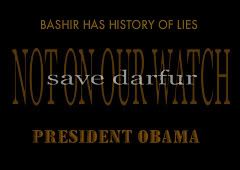SITTING PRESIDENT OF SUDAN ISSUED A WARRANT FOR ARREST
Court Issues Warrant for Arrest of Sudan President
Source:
http://www.nytimes.com/2009/03/05/world/africa/05court.html?_r=1&hp
PARIS — The International Criminal Court issued an arrest warrant Wednesday for President Omar Hassan al-Bashir of Sudan for war crimes and crimes against humanity, ignoring diplomatic requests to delay the warrant to allow time for more peace negotiations in the conflict-riddled Darfur region of his country.
It is the first time the court, which opened in 2002, has sought the arrest of a sitting head of state, though other international war crimes courts have issued warrants for Slobodan Milosevic of Serbia and Charles Taylor of Liberia while they were sitting presidents.
The registrar for the court, Silvana Arbia, said that Mr. Bashir was accused of being personally responsible for “directing attacks against the civilian population” of Darfur and “murdering, raping, and forcibly displacing millions of civilians.”
The crimes took place, Ms. Arbia said, during a five-year campaign against rebel organizations in Darfur which opposed the government in Khartoum that began in 2003. The campaign, the court said was the result of a plan agreed at the highest level of the government in Khartoum that lasted until July 14, 2008, which is the date of the arrest warrant.
The warrant charges Mr. Bashir with five counts of crimes against humanity — murder, extermination, forcible transfer, torture, and rape, and two counts of war crimes — intentionally directing attacks against a civilian population, and pillaging. The warrant does not accuse Mr. Bashir of genocide, but Ms. Arbia said the court consider that charge if additional information from the prosecutors becomes available.
The arrest warrant is likely to complicate the international debate over how to solve the crisis in Darfur. It came despite concerns voiced by United Nations diplomats, the African Union, the Arab League, and some humanitarian organizations that it could provoke renewed violence in the country and put at risk the peace process in southern Sudan.
The government in Khartoum has vowed to defy the arrest warrant, making it unlikely that Mr. Bashir will be brought to the court any time soon. But analysts said the warrant will weaken Mr. Bashir’s position internationally, making it possible that he could fall from power more rapidly than he would otherwise.
In announcing the indictment, the court’s chief prosecutor, Luis Moreno Ocampo, said more than 30 witnesses will testify that Mr. Bashir controlled a genocidal campaign aimed at wiping out three ethnic African tribes in Darfur, the Western region of the vast nation south of Egypt.
The question now is who will execute the warrant. Sudan is legally obliged to arrest him, but such a move is not expected any time soon. The Hague court has no police force or military of its own, and the 24,000 or so United Nations peacekeepers stationed in Sudan have no mandate to detain war crimes suspects.
If Mr. Bashir travels to any of the 108 nations that are members of the court, he risks arrest, because court members will be obliged to detain him. The 80 or so countries that are not court members, including China, Russia and the United States, have no such obligation. But lawyers say those nations can arrest Mr. Bashir because several treaties state that heads of state enjoy no immunity if they are charged with genocide, crimes against humanity or war crimes.
Even if Mr. Bashir remains free, analysts who favored his arrest say the warrant is likely to have a worldwide effect.
“This means he will be a fugitive, a man on a wanted poster held to be most responsible for the atrocities of Darfur,” said Richard Dicker, a director of Human Rights Watch.
Other analysts and activists argued that the warrant could undermine his political position at home. Nick Grono, deputy president of the International Crisis Group, wrote recently that “although Mr. Bashir and his security apparatus are still entrenched in power, the indictment is likely to weaken their hold. It may even cause the army and intelligence agencies, the ultimate wielders of power, to contemplate a future without Bashir.”
Many observers fear, however, that weakening Mr. Bashir could result in more violence in the region, at least in the near term.
“I am sure there will be some crowd movements, there will be some violence here and there,” said Alain Le Roy, the United Nations undersecretary general for peacekeeping operations.
Some figures in the government have threatened bloodshed in response to an indictment. Salah Gosh, the head of Sudanese intelligence, was quoted in Sudanese press reports as calling for the “amputation of the hands and the slitting of the throats of any person who dares badmouth al-Bashir or support the International Criminal Court’s allegations against him.”
Another worry, Mr. Le Roy said, was that any of the groups involved in the conflict, including the governments of Sudan and Chad as well as the rebels, might take advantage of any uproar surrounding the court’s decision to foment violence. And the delays in deploying United Nations peacekeeping troops to Darfur, with only about 64 percent of the force there, will likely worsen because of possible new tension in the region.
Mr. Le Roy also said, however, Sudan had reassured the United Nations officials that the government would respect its commitment to protect United Nations peacekeeping missions and other agencies. There were no immediate plans to scale back patrols or otherwise retreat from the prescribed mission he said.
All credit of this article:
Neil MacFarquhar and Sharon Otterman contributed reporting from New York.
~~~~~~~~~~~~~~~~~~~~~~
For more information:
Labels: ARREST WARRANT FOR BASHIR, Crimes, Darfur, Genocide, ICC, ilovemylife, Indictment, Killing, Lies, Obama, Politics, Sandra Hammel, Silence Kills, Sudan, The Hague, USA, Weapons



0 Comments:
Post a Comment
Subscribe to Post Comments [Atom]
<< Home